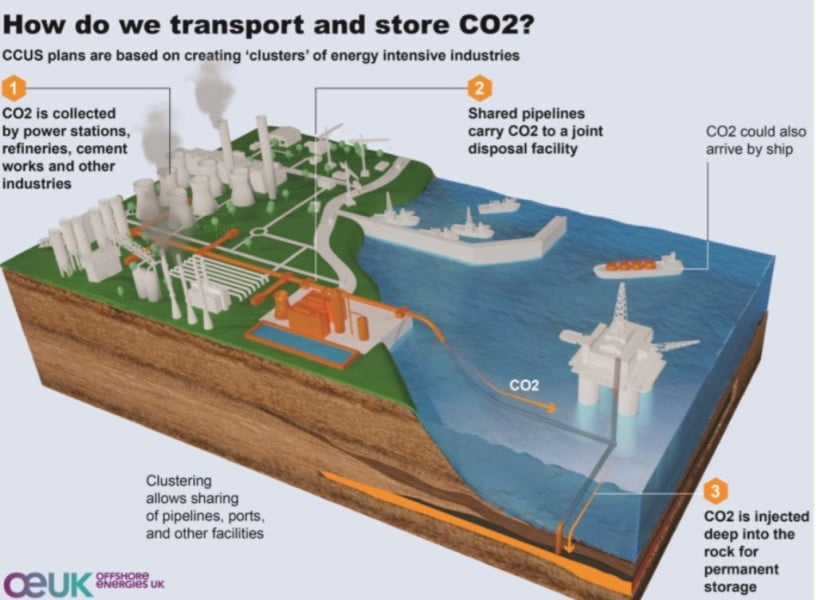Offshore Energies UK (OEUK) reports that the UK can become a world leader in carbon storage following an announcement of 20 licenses for storing millions of tonnes of CO2 in rocks deep below its surrounding seas, said Offshore Energies UK’s chief executive David Whitehouse.
Whitehouse said the decision to offer 13 areas off the UK’s coast as sites for permanently storing millions of tonnes of CO2 meant the UK could pioneer a technology that would be essential in the fight against climate change.
According to the OEUK press release, “It follows today’s announcement by the North Sea Transition Authority that it is awarding 20 carbon storage licenses to 12 companies. The licenses cover 12,000 sq km at offshore sites near Aberdeen, Teesside, Liverpool, and Lincolnshire.”
Some of the sites are expected to be in operation in as little as six years. They are expected to make a vital contribution to the UK target of storing up to 30 million tonnes of CO2 a year by 2030. This would reduce the UK’s total greenhouse gas emissions by up to 10%.
The seabeds around the UK contain rock formations with the potential to hold up to 78 billion tonnes of carbon dioxide. That is the equivalent of two centuries’ worth of the UK’s emissions today – and one of the biggest storage capacities in Europe. The carbon capture and storage opportunity could be worth £100bn to the UK’s energy supply chain by 2050.
This first carbon storage licensing round is likely to be the first of many, as it is estimated up to 100 CO2 stores could be needed for the UK to meet net zero by 2050, according to OEUK.
OEUK’s Chief Executive Officer, David Whitehouse, said: “Carbon capture will be a key tool in the global fight against climate change. These pioneering projects can create a wave of new jobs across the country, provide new opportunities for UK businesses at home and abroad, and maintain our world-leading action to reach net zero.
“The UK’s offshore oil and gas industry has the expertise needed to make carbon storage a success – and these license awards can showcase our heritage of energy production skills to the world. If we get this right, it will not only help the decarbonization of heavy industry, power generation and manufacturing globally but also create growth and export opportunity for industrial communities across the UK.
“But we will need 100 such sites or more, and the Track 1 and 2 clusters to be accelerated, if we are to reach net zero – so we mustn’t stop here. We look forward to the Government’s continued support for CCUS to make sure the UK secures a leadership position in this exciting new sector.”

